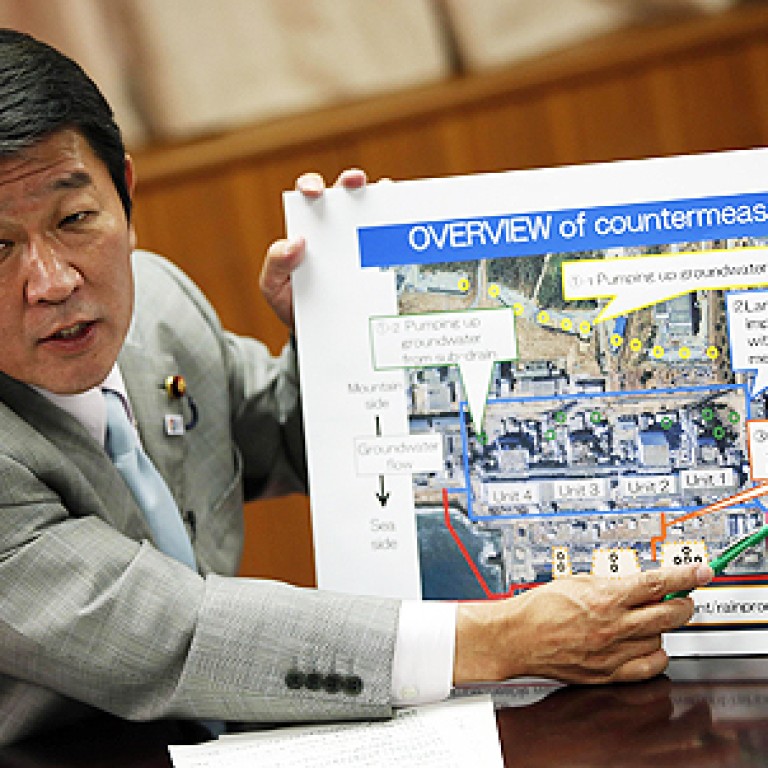
Japan in touch with US, others on Fukushima water crisis
Japan is in touch with experts in the United States and elsewhere on ways to control the spread of irradiated water at the wrecked Fukushima nuclear plant, trade and economics minister Toshimitsu Motegi said.
We will be looking for the best knowledge, technology and information with regard to how to manage the contaminated water at the plant
“We will be looking for the best knowledge, technology and information with regard to how to manage the contaminated water at the plant and how to decommission the complex,” Motegi said in an interview on Wednesday.
Japan was criticised for being slow to seek overseas help in the early stages of the response to the Fukushima disaster two and a half years ago. Despite a pledge to tap global expertise to decommission crippled reactors, nuclear contractors in the United States and Europe have been largely shut out of the project.
Japan’s government this week pledged nearly US$500 million to contain leaks and decontaminate radioactive water at the coastal Fukushima plant, which was hit by a massive earthquake and tsunami in March 2011 that triggered reactor meltdowns in the worst nuclear disaster since Chernobyl.
The steps come as the International Olympic Committee decides on Saturday whether Tokyo – some 230 km from the stricken plant – will host the 2020 Olympic Games. Prime Minister Shinzo Abe has helped lead the campaign to win the bid to host the Games and officials have been eager to show the crisis is under control, even as radiation levels at parts of the Fukushima plant have spiked to record highs.
Motegi, who has been sharply critical of the plant operator, Tokyo Electric Power Company (Tepco) – he has likened its response to an escalating problem with irradiated water to a game of “whack-a-mole” – said Japan has been in touch with a national research facility in the United States for ideas on how to deal with the contaminated water, as well as other overseas experts. He did not provide details.
A spokesman for the Ministry of Economy, Trade and Industry said no decision had been made on whether to use the technology suggested by overseas experts and declined to provide specifics on those exchanges.
Motegi said it was too soon for Japan to consider a legal framework that would give the government sole oversight for scrapping the Fukushima reactors.
Yasuhisa Shiozaki, acting policy chief of the ruling Liberal Democratic Party, has proposed creating an agency similar to Britain’s National Decommissioning Authority, a public body charged with dismantling Britain’s atomic power stations.
“This will take thinking through questions like our overall energy policy and taking a big-picture view of the situation,” Motegi said. “To create a new agency with a single mission would not necessarily accelerate the work that needs to be done.”
Japan’s nuclear industry, which once provided a third of the nation’s power, has nearly ground to a halt since the Fukushima disaster.
Tepco has been pumping water over the reactors to keep them cool and storing the radioactive wastewater in above-ground tanks. The utility said last month that at least one of those hastily built tanks was leaking. It has also found high radiation levels just above the ground near other tanks, suggesting widespread structural problems.
Those revelations spurred the government intervention. Under the new steps, Tokyo will fund a US$400 million project spearheaded by Kajima Corporation to ring the area around four reactors with a wall of frozen earth to keep groundwater from seeping towards them and becoming contaminated.
More money will be used to build a water treatment facility that can remove all radioactive particles from water except tritium, considered the least harmful to humans.
Motegi said the Advanced Liquid Processing System (ALPS), developed by Toshiba and Utah-based EnergySolutions but which has been stalled for months due to safety problems, would begin running this month.

